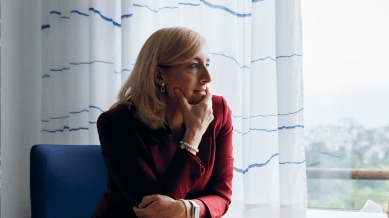Click here to join Express Pune WhatsApp channel and get a curated list of our stories
World Health Summit: Need to reduce reliance on external aid for global health, says German Minister
Crisis or catalyst for change: Experts say need for reset in global health

With the exisiting resource constraints exacerbated by budget cuts for global health institutions, Nina Warken, Federal Ministry of Health (BMG), Germany said that there is a need to reduce reliance on external aid.
Warken was speaking on the second day of the World Health Summit in Berlin.
monthly limit of free stories.
with an Express account.
At a panel discussion at the summit, experts spoke about the shrinking financial spaces, what role “innovative financing” can play and whether the shift in financing presents an opportunity for Low- and Middle-Income Countries (LMICs) to build self-sustaining, locally led systems.
Sania Nishtar, CEO, GAVI the Alliance, Peter Sands Executive Director, Global Fund to fight AIDS, Tuberculosis and Malaria and Kieran Daly, Director Gates Foundation, Global Health Agencies and Funds were part of the discussion.
Conversations are underway to boost stronger health systems at the annual World Health Summit that brings together global health stakeholders from all sectors and regions to find solutions for the most pressing health challenges. Under the theme “Taking Responsibility for Health in a Fragmenting World”, across three days the summit has sparked exchange, generated insights and catalysed science based and inter disciplinary solutions.
Bruce Aylward, Advisor to the Director General of World Health Organisation later told The Indian Express that they were looking at the situation positively and that global health’s need for a reset is being felt.
The global burden is immense. NCDs, including cardiovascular and lung diseases, cancer and diabetes, are the leading causes of death worldwide, claiming at least 43 million lives in 2021, including 18 million people aged under 70 years.
At a key session, Nina Warken said that they take their responsibility seriously on global health and gatherings like these are sending a strong signal that global health remains a priority. “Recent cuts in financing make it painfully clear that there is a need to reduce reliance on external aid,”Marken added.
“The World Health Organisation is going through major reforms,”
Dr Jeremy Farrar , Assistant Director-General, Health Promotion and Disease Prevention and Care at WHO said, adding that that we were at an inflection point.
“However the disruptions of the past year are behind us and now is the time to move forward with creativity rather than remain stuck in negativity. Creative solutions won’t come from a place of nihilism or pessimism,we need optimism and bold thinking to drive real progress,” Dr Jeremy Farrar, added.
Katie Dain, CEO, NCD Alliance said that the ripple effect of these summits and panels was seen in how governments were improving their response.
Dain also referred to the political declaration for the fourth high level meeting on NCD and mental health that failed to receive formal endorsement at the 2025 high level session because the United States objected, breaking the consensus process. “We have fallen behind achieving targets to reduce NCDs and hence this political declaration is so important,” Dain said, hoping for a positive outcome as the declaration will proceed to a formal vote in the General Assembly in the coming weeks.
Germany announces €1 Billion fight AIDS, Tuberculosis, Malaria
On the first day of the WHS 2025, Reem Alabali Radovan, Federal Minister for Economic Cooperation and Development (BMZ), announced Germany’s financial commitment of 1 billion euros to the Global Fund to fight AIDS, Tuberculosis and Malaria,
Peter Sands, Executive Director of the Global Fund, highlighted: “The Global Fund’s Eighth Replenishment is a once-in-a-generation opportunity to curb the spread of infectious diseases and further reinforce health and community systems in the most vulnerable countries. With innovations like lenacapavir, AI-powered TB detection, and smart mosquito nets, we have the tools; now we need the political will. Germany’s latest contribution sends a powerful signal of global solidarity and sets a strong foundation as we move toward the final pledges at our Eighth Replenishment Summit.”
Click here to join Express Pune WhatsApp channel and get a curated list of our stories